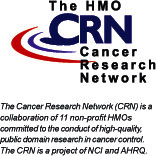

  |
 |
 |
|
 |
Page One Page Two Page Three Page Four Back to Newsletters |
| Volume III, Issue 1 | April 2002 |

|
News from NCI CRN a model for NCI research networks
NCI has received the CRN renewal application and will be reviewing it in June, with word about funding expected in September.
To learn more about NCI's program announcement aimed at improving the delivery, use, and short-term outcomes of colorectal cancer screening in primary care practice, take a look at: http://cancercontrol.cancer.gov/ARP/research/colorectal.asp.
The Centers for Population Health and Cancer RFA was released April 1. It is available at: http://grants1.nih.gov/grants/guide/rfa-files/RFA-ES-02-009.html
Recently, several members of top NCI leadership, including Barbara Rimer, have commented that they see CRN as a model for how large NCI-sponsored research networks should function.
- Martin Brown, NCI Ed's Corner of the World
The renewal proposal has been submitted, resulting in four very strong research projects and some important changes (we hope improvements) to the Infrastructure. The process and spirit with which we selected the four research projects speaks volumes about the success of the CRN, and why this crazy confederation of very different people and organizations tends to work.
We decided to invite anyone in the CRN family with a research
idea to develop a concept proposal, and then subject those proposals to rigorous, objective review. We received 22 concept proposals and had them reviewed by four different individuals - two scientists with related expertise from the CRN or our Academic Liaison Committee, a biostatistician, and an administrative or programming staff person. Over 80 people participated in these reviews and only a handful said no. There were two more steps involving revisions and further reviews by the Steering Committee that ultimately led to the "final four." Thanks to the extraordinary level of effort expended by the reviewees and reviewers, I believe that most feel that the process was open and fair and civil, and resulted in strong projects both for the renewal application and for submission as future RO1s.
Our thanks to everyone involved.
|
 |
 |
 |
|